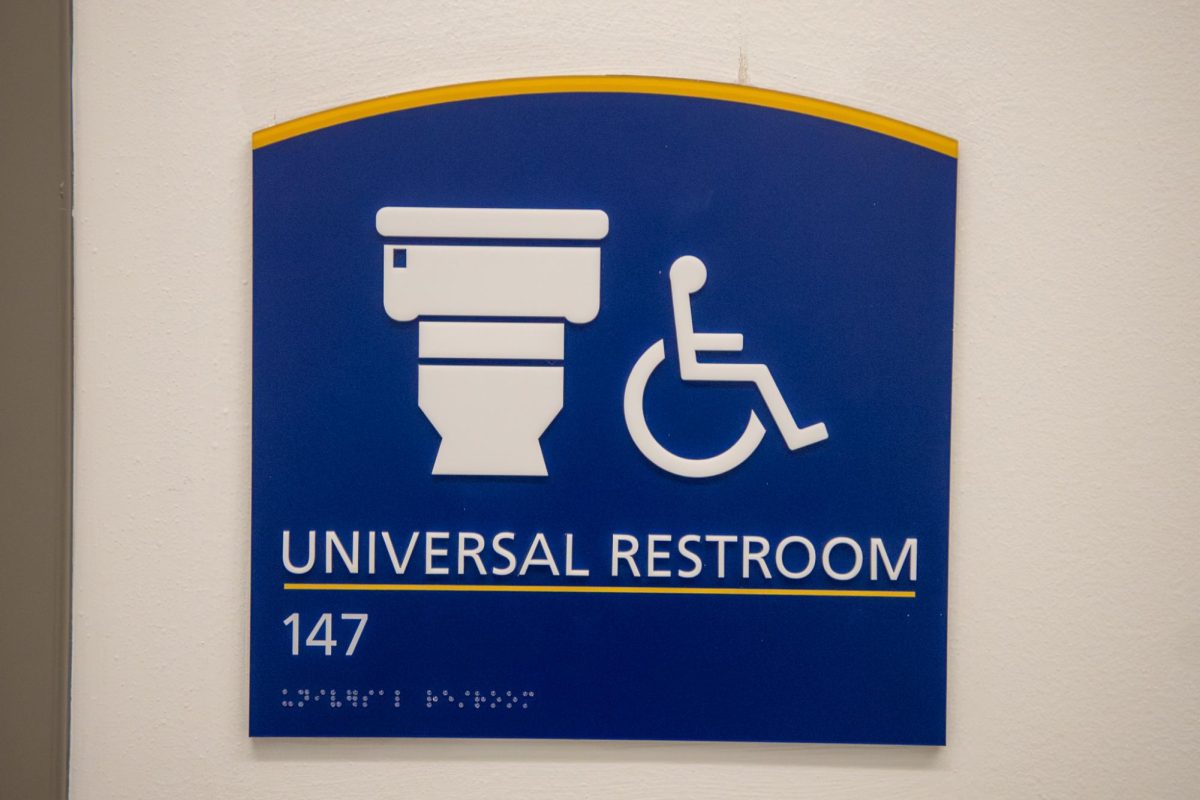Editor’s note: The student taking down bathroom gender signs was granted anonymity for their concerns about disciplinary action.
The Protect All Students Act included in SB 104, widely known as the “Bathroom Bill,” went into effect Feb. 25. The bill prohibits K-12 and all public and private universities from creating and supporting all-gender restrooms, locker rooms and shower rooms.
The bill prohibits multiple genders from using multi-stall bathrooms, which are found in many residence halls. Since the bill went into effect, halls have experienced changes to restrooms. Kent Interhall Council held an open forum meeting Feb. 18 to answer questions and address student concerns.
Jill Jenkins, University Housing senior executive director, spoke at the meeting.
“There is what we call a swing door that usually gets shut when custodial is cleaning one half [of the bathroom],” she said. “They close that half so they can clean it, and then they go to the other side and clean that half, and then they open it when they leave.”
Instead, the university will have one side closed permanently to become single occupancy universal bathrooms and the other side will be gendered.
A student has been taking down the new bathroom signs placed in Olson and Lake Halls in protest. The Kent Stater granted her anonymity to speak about why.
“This wasn’t a coordinated effort,” she said. “I just walked past the bathroom and I saw a sign that said woman on it. In that moment, I felt what a lot of other trans and gender nonconforming people felt, I felt afraid and I felt angry.”
University response
Kent State created a committee to address SB 104 involving faculty from across campuses. They notified students in an email sent out Feb. 10 that the interactive campus map was updated to make navigating and identifying single-occupancy universal restrooms easier.
The email stated improvements to restroom signage would be made to “prioritize the safety and dignity of all students, staff, faculty and visitors.”
Amanda Feaster, the director of Student Accessibility Services, has been heavily involved in updating the campus map. She said the number of universal restrooms on campus will increase so everyone knows where they are.
Morgan Woodin, coordinator of operations and special projects for the Division of People, Culture and Belonging, spoke at a Transfusion meeting with Feaster on Jan. 19 regarding the repercussions of SB 104.
“Our priority is to develop clear and compassionate guidance for implementing the new state requirements, prioritizing the safety and dignity of all our students, staff, faculty and visitors,” Woodin said.
Jenkins clarified the goals of using gendered bathroom signs.
“Students are going to follow the signs that make sense for them,” Jenkins said. “Part of our process is not to enforce which bathroom students are using, it’s just to provide the signage for those who want to use a certain bathroom a lot. I anticipate a lot of our students are going to want to use single occupancy because it provides more privacy.”
Student reactions
Harper Whitecar, a transgender junior environmental conservation biology major, attended the Transfusion meeting.
“I feel like a lot of these Republican lawmakers do not see trans or queer people in general as on the same level as them,” she said. “I don’t want to say sub-human, but it definitely seems that way, just based off of the language that they’ve been using.”
Whitecar said she feels the bill is very vague in terms of how it is going to be enforced, and transgender students will not be the only people subject to repercussions.
“It effectively incentivizes people to harass trans individuals, and not just trans individuals, anybody who looks to appear outside of the gender binary,” Whitecar said.
Ivory Herman, a sophomore journalism major, said he feels that Kent State has not done a good job with advocacy.
“I feel as though Kent State could really do a lot more to show their empathy for a lot of demographics,” Herman said. “I know that it’s hard because they don’t want to be biased and judgmental to other groups, but knowing and coming to Kent State as a liberal arts school, I think that it’s kind of a given that we’re more left here.”
Repercussions of using a bathroom opposite of one’s sex have not been clarified.
A FAQ website with general information about the bill has been published through the Division of People, Culture and Belonging website.
“They want us to panic, they want us to be afraid, they want us to feel fear and they want us to be complicit,” the anonymous student said. “The best way you can not do those things is by getting involved with your local student organizations that are fighting this. If you feel like this is wrong, then you should fight for what you believe are your rights.”
Aryn Kauble is a reporter. Contact him at [email protected].




